
The Amazing Spider-Man (vol. 1) #1
Title: “Spider-Man”
Medium: comic
Cover date: Mar. 1963
Publisher:
Keywords: space travel, hatred, jealousy, sacrifice, news media, vengeance, love of family, love of enemies
11 characters in this story:
| Character (Click links for info about character and his/her religious practice, affiliation, etc.) |
Religious Affiliation |
Team(s) [Notes] |
Pub. | # app. |
||||||
|---|---|---|---|---|---|---|---|---|---|---|
|
|
Secret Defenders; Spider-Man and His Amazing Friends...  |
 |
10,664 | ||||||
|
|
[raised Peter Parker (Spider-Man)] |  |
1,368 | ||||||
|
|
[Peter Parker's boss; Spider-Man's denouncer] |  |
1,719 | ||||||
|
The Avengers (staff); U.S. Air Force [J. Jonah Jameson's son] |
 |
231 | |||||||
|
|
[murdered Spider-Man's Uncle Ben] |  |
9 | ||||||
|
[Spider-Man's former agent] |  |
13 | |||||||
|
[major NYC newspaper; Peter Parker's employer] |  |
699 | |||||||
|
|
U.S. Army |  |
718 | ||||||
|
[longtime friend of Peter Parker] |  |
429 | |||||||
|
[1st app: Amazing Fantasy (vol. 1) #15 (Aug. 1962)] |  |
25 | |||||||
|
prob. indeterminate | [landlord of May Parker (and young Peter/Spider-Man)] |  |
1 |
HIGHLIGHTS: Powerful newspaper publisher J. Jonah Jameson is introduced. Jameson has some valid points, but his fervent public campaign against Spider-Man seems irrational. His only identifiable "religion" is "hating Spider-Man." Aunt May exhibits great self-sacrifice while financially supporting her nephew Peter Parker, yet she remains cheerful. Desperate for money, Peter Parker ponders using his powers to steal money, but he quickly dismisses the idea.
There is little overtly religious content in this story, but we cover this story here in considerably more detail than we might otherwise do because of its historical significance as the first issue of The Amazing Spider-Man.
BELOW: All 14 pages of Amazing Spider-Man #1 (story 1):

Source: The Amazing Spider-Man (vol. 1) #1 (Mar. 1963). Written by Stan Lee. Art by Steve Ditko.
This first of two stories published in the very first issue of The Amazing Spider-Man is most notable for featuring the first appearance of Spidey-hating Daily Bugle newspaper publisher J. Jonah Jameson. "J.J.J." (as is is fondly known) was from the onset one of the most important supporting characters in the Spider-Man mythos, and became one of the best known supporting characters in all comicdom.
Not only does this story introduce J. Jonah Jameson, it firmly established Jameson's principle characteristics and motivations. Naturally enough, additional nuance and color has been added to this character in the 45 years since his introduction. But it is remarkable at how completely the character is presented in this first story. He seems little different in this 1963 story than he does in comics and films today.
J. Jonah Jameson's "religion" has been described as "hating Spider-Man" because, after decades of appearances, this has been the character's principle motivation and driving raison d'etre. If one examined only this story, then the only identifiable "religion" for Jameson would be exactly this: hating Spider-Man.
The featured plot itself features is completely devoid of the colorful super-villains that would become a hallmark of Spider's tales. Rather, the plot revolves around J. Jonah Jameson's astronaut son being in peril due to a landing capsule malfunction. There's nothing inherently wrong with that. These plot elements are not surprising for the early 1960s, a time in which America was in a space race with the Soviet Union and astronauts were idolized by the public. Although the story clearly exhibits an enthusiasm for space travel, it also exhibits a stunning ignorance of what today is commonly known basic science.
Stan Lee may have been appreciative of science and interested in its use in storytelling, but as this story demonstrates, he was not a scientist at heart. Even the most pedestrian and scientifically casual prose science fiction writers of the time would not have portrayed a NASA landing capsule continually orbiting the Earth at airplane-flying heights. Spider-Man actually rescues the orbiting space capsule by commandeering a military jet plane and using it to intercept the capsule. When Spider-Man intercepts the landing capsule, it is "losing altitude dangerously," but it is still orbiting.
45 years later it may seem easy for contemporary readers to shake their heads and wonder what Stan Lee was thinking. But keep in mind that in 1963 the era of manned space flight was just dawning. Non-scientists such as Stan Lee had not had the benefit of decades of news reports and TV stories and films about space flight to fix in mind basic mechanics of space flight, orbits, and re-entry. Stan Lee had doubtless seen film and photo footage of NASA's space capsules, was familiar with manned space flights that had orbited the Earth, but he simply didn't understand that without any sort of propulsion system, a landing capsule would not stay "in orbit" at sub-orbital heights, where friction with the Earth's atmosphere would eliminate orbital velocity.
Still, to his credit, Lee seems to have some sense of the situation. The landing capsule is, after all, depicted in a peril because its atmospheric "orbit" is degrading due to a hardware malfunction. But the story doesn't depict an instant loss of orbital velocity once the landing capsule is within the atmosphere. It depicts an "orbiting" landing capsule that remains aloft with largely horizontal direction for at least many hours. The peril the landing capsule is in lasts long enough for NASA to send up an aircraft which attempts to intercept the landing capsule by dropping a net attached to a parachute toward it. Them Spider-Man has time to web across the city to New York's NASA office, promise to rescue the astronaut, and then make his way to an air force base, commandeer an airplane, and fly up to the where the landing capsule is orbiting.
Of course, another scientific problem with the whole story is the fact that the landing capsule appears to be "orbiting" not by flying around the Earth, but by flying in circles in air space above New York City.
Note how the obviously invalid "science" associated with Spider-Man having super-powers doesn't seem objectionable or distracting. This is because we understand Spider-Man's powers are really more akin to fantasy than "pure" science fiction, and these super-powers are part of a long, proud tradition of super-hero comics. The "bad science" associated with the landing capsule seems more jarring to modern readers because it involves real-world technology: Apollo-era NASA rockets and landing capsules. The technology isn't not super-science or alien technology or from the future or whatnot. So we expect this realworld technology to behave the same way as realworld technology we are accustomed to.
None of these science errors makes this a "bad story" per se. It's just that the science is very, very bad. But as a whole, this is revolutionary, influential, very effective story-telling. Stan Lee's characterization is masterful and continues in this second Spider-Man story to "break the mold" of traditional super-hero comics. Peter Parker, far from being the pristine interchangeable hero of traditional super-hero comics, seems genuinely human and flawed. Even while saving astronaut John Jameson from certain death, Peter Parker is often thinking more about how he can use his Spider-Man powers to make money, gain fame and adulation or have vengeance on those who have wronged him. Twice in this story, Peter Parker ponders whether he should turn to a life of crime as a thief or "menace." These mixed motivations and more "earthy" concerns might seem commonplace today, but in 1963 Spider-Man really was a revelation.
Amazing Spider-Man #1 actually features two stories, each roughly half of the length of the full magazine. This was a practice that was more common in 1963 than now. The first story, which has no title other than "Spider-Man", is not the cover story. The story depicted on the cover, in which Spider-Man encounters the Fantastic Four for the first time, is the second story.
Page 1: It is significant to note that J. Jonah Jameson appears on the very first page of this story, which is a splash page. This is the first-ever appearance of the character, who will be named just a few pages later. Among Peter Parker's supporting cast, only Aunt May, the now-deceased (but oft-remembered) Uncle Ben, Flash Thompson and the as-yet unnamed Liz Allan appear earlier in Spider-Man's chronicles - in the character's debut story in Amazing Fantasy #15.
The splash page on page 1 clearly illustrates the real significance of this story: It isn't about Spider-Man saving an astronaut in an out-of-control landing capsule so much as the story is about the beginning of J. Jonah Jameson's public vendetta against Spider-Man. Jameson is largely responsible for one of the biggest problems Spider-Man faces: Despite being a super-hero, much of the public regards him as a menace and a criminal. Right on this splash page we read the shouts coming from the angry croud: "Freak! Public menace!"
Page 2 starts out with an amazingly condensed re-telling of Spider-Man's origin. In less than a page, Spider-Man's origin and motivations are aptly captured.
Peter Parker is once again classified here as a "bookworm," a word used repeatedly by narration and other characters to describe him. This may be that era's version of "nerd" or "geek."
Peter Parker exhibits great anger and regret about the recent murder of his beloved Uncle Ben: "All because I was too late to save him!"
Peter clearly recounts how after gaining spider-powers, he did not embark on a career as a hero or crimefighter. Rather, he designed a costume and used his powers to "go into show business and cash in." He recalls how it was while he was "showing off" that an armed burglar killed his uncle. Peter recalls how, when he returned home to find his uncle had been killed, he sped off to find the killer, "lusting for vengeance." Peter Parker's own account of his origin is a tale of greed, pride, selfishness and vengeance - all of which seem like decidedly "unheroic" traits.
BELOW: Greed, vengeance and regret: An amazingly condensed re-telling of Spider-Man's origin:

Source: The Amazing Spider-Man (vol. 1) #1 (Mar. 1963), pg. 2, panels 1-3. Written by Stan Lee. Art by Steve Ditko.
On the bottom of page 2 we see that Peter Parker is clearly saddened by the death of his Uncle Ben. Along with Aunt May, Uncle Ben had doted on Peter and been a truly loving "parent." Peter sees Aunt May asking their irate landlord for more time to pay their rent. Without Uncle Ben working to pay the family's bills, Peter is concerned that they are in dire straits economically. This concern for money (and a desire to use his powers for economic gain or simply economic survival) is echoed throughout the rest of this story as well as in the stories that follow. Peter Parker's money woes will remain an aspect of the character throughout most of his history, making the character decidedly different from wealthier heroes such as Batman, the Fantastic Four, Iron Man, etc. In these early stories, Peter often seems more concerned with money than he does with the "great responsibility" that comes with his having "great power."
BELOW: Peter Parker is desperate for money after his Uncle Ben's death:
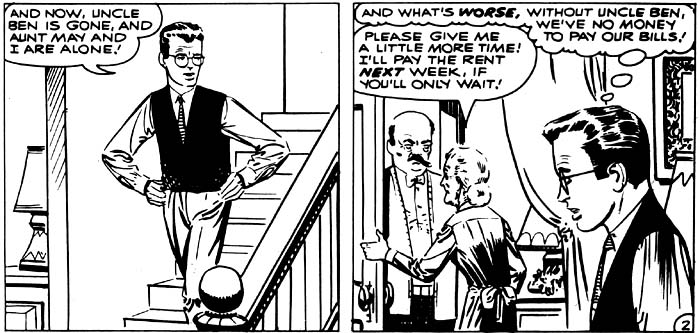
Source: The Amazing Spider-Man (vol. 1) #1 (Mar. 1963), pg. 2, panels 4-5. Written by Stan Lee. Art by Steve Ditko.
Page 2 Complete Text:
Narration: Our scene is the bedroom of Peter Parker, the teen-age student whom many consider to be a shy bookworm . . . but, oh, if they only knew!
Peter Parker: Uncle Ben is dead! And all because I was too late to save him! My Spider-Man costume! I wish there were no such thing!
Peter Parker: [Narrating his flashback] It all started when I was bitten by a radio-active spider . . . and I found myself possessed of a spider's powers! So I designed a costume to go into show business and cash in!
Peter Parker: [Shown, within his own flashback, being bitten by the radioactive spider.] Ouch!
Peter Parker: [Narrating his flashback] But while I was busy showing off, an armed burglar fired one fatal shot at Uncle Ben when he was surprised robbing our house! As soon as I learned what had happened, I sped thru the city via my spider's web, lusting for vengeance!
Spider-Man (Peter Parker): [Shown, within his own flashback, web-slinging through the city.] He won't escape Spider-Man!
Spider-Man (Peter Parker): [Shown, within his own flashback, sticking to a wall in a warehouse, webbing the burglar.] Got you!
Burglar: [Shown, within Peter Parker's flashback.] Y-you ain't human!
BELOW: Peter Parker ponders turning to crime to pay the bills, but realizes that just isn't him, and doing so would break Aunt May's heart:
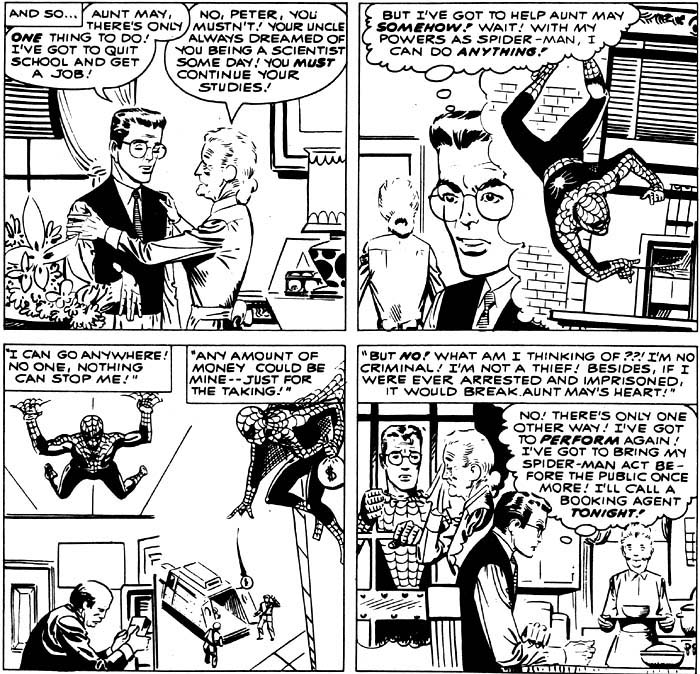
Source: The Amazing Spider-Man (vol. 1) #1 (Mar. 1963), pg. 3, panels 1-4. Written by Stan Lee. Art by Steve Ditko.
On page 3 we see a worried Peter Parker decide to quit school and get a job so they can pay the bills. But Aunt May selflessly encourages Peter to continue his schooling so he can pursue his dream of working as a scientist. It is interesting that Aunt May here seems more interested in seeing Peter become a scientist than he himself is at this time. Clearly science is important to Peter, but making money is more important to him at this juncture. Both Aunt May and Peter Parker want to sacrifice for the well-being of each other.
Peter Parker even briefly considers turning to theft in order to get money. He realizes that with his amazing powers, he could probably get away with doing so. But Peter quickly dismisses the idea for a couple of reasons. Most importantly, Peter knows this simply isn't who he is. He is not a thief. His aunt and uncle raised him to have better morals than that. Also, Peter realizes that if he was ever arrested, the shame would break his beloved aunt's heart. He can't bear to think of putting her through that.
To recap, Peter Parker here has two different reasons for not becoming a thief:
1. Being a thief simply isn't who he is at heart. (He has been taught better. He is a moral and ethical person.)
2. Peter does not wish his beloved Aunt May to suffer. He knows that if he was caught, the shame of his crime would hurt her deeply.
So Peter decides to act honorably and morally. Rather than doing anything criminal or immoral, he will try once again to use his powers to earn money as an entertainer. Doing this has worked before, and he reasons that he should be able to do so again.
Note that although Peter here decides against crime or hurting others, his concerns are still primarily for himself and his family. His economic concern for him and his aunt weigh far more heavily on his mind than any desire to help others or be a "super-hero."
BELOW: Flash Thompson once again dismisses shy, unpopular Peter Parker as a "bookworm":

Source: The Amazing Spider-Man (vol. 1) #1 (Mar. 1963), pg. 3, panels 5-6. Written by Stan Lee. Art by Steve Ditko.
On the bottom of page 3 we once again see Peter Parker drawn as a scientist, wearing a traditional lab coat while doing chemistry in school. The other kids are more interested in reading about an upcoming public performance by Spider-Man. Flash Thompson once again calls Peter Parker a "bookworm." Now how Liz Allan (recognizable but as-yet unnamed) seems particularly upset that Peter Parker says he won't go to the performance with them. It becomes more clear in subsequent stories that the very pretty Liz is actually attracted to Peter. She has continually been part of the crowd of kids teasing him, but she seems to treat him more kindly than the others.
Peter, of course, can not attend the performance with his classmates because (unbeknownst to them) he is the star of the show in his masked identity as Spider-Man.
Page 3 Complete Text:
Narration: And so . . .
Peter Parker: Aunt May, there's only one thing to do! I've got to quit school and get a job!
Aunt May: No, Peter, you mustn't! Your uncle always dreamed of you being a scientist some day! You must continue your studies!
Peter Parker: [Thinking] But I've got to help Aunt May somehow! Wait! With my powers as Spider-Man, I can do anything! I can go anywhere! No one, nothing can stop me! Any amount of money could be mine -- just for the taking!
[Peter imagines himself robbing a safe and then robbing an armored car, using his powers while wearing his Spider-Man costume. In he next panel, he imagines himself locked up in jail, unmasked, while a weeping Aunt May looks at him from the other side of the bars.]
Peter Parker: [Thinking] But no! What am I thinking of??! I'm no criminal! I'm not a thief! Besides, if I were ever arrested and imprisoned, it would break Aunt May's heart! No! There's only one other way! I've got to perform again! I've got to bring my Spider-Man act before the public once more! I'll call a booking agent tonight!
Narration: A few days later . . . at school . . .
student: Hey, gang! Look! Spider-Man's gonna put on a show at the town hall tonight!
Liz Allan: And the admission is only a dollar!
Flash Thompson (?): Let's all go!
Peter Parker: [Standing nearby doing a chemistry experiment] Count me out, kids! I can't make it!
Liz Allan: We might have known! He'd rather study!
Flash Thompson (?): Aw, who needs that walkin' bookworm anyway!
female student: It'll be more fun without him!
In panel 1 on page it is interesting to note that Aunt May says it was Uncle Ben who always dreamed of Peter becoming a scientist. What is the significance of this? There has never been any indication that Uncle Ben was himself a scientist. He has always been portrayed as a working-class blue-collar man. Did Uncle Ben simply "dream" of Peter becoming a scientist because that's what Peter wanted to do, and it was Uncle Ben's desire to see Peter be happy and achieve his goals? This seems to be the most likely interpretation, given how Peter and Uncle Ben have been portrayed generally.
But there is another possible interpretation. Did Peter, because he loved his uncle so much, actually want to become a scientist because it was Uncle Ben's desire that he do so? Is Peter really less of a scientist at heart than he sometimes tries to be? Perhaps Peter has long felt obligated to work as a scientist because doing so would fulfill his uncle's dreams, not becaus it's what he really wanted to do. If Peter really wanted to work as a scientist, he certainly could do so. He has the raw talent and intellect to easily carve out a successful career as a research scientist or inventor. But he has always slipped away from that life, into doing other things, such as working as a photographer, a teacher, or a full-time hero. This isn't to say that being a scientist isn't truly an important part of Peter Parker's inner persona. But this alternative take on Uncle Ben's dreams versus Peter's own dreams is something to think about when one tries to answer questions about Peter, with his talent for science, has so rarely worked as a professional scientist.
The events depicted on page 4 marry the fantasy of super powers with real-world considerations. Trying to earn money for his family, Peter Parker puts on a public paid performance. But the check is written out simply to "Spider-Man" and the bank won't cash it for him because he doesn't have identification in that name and "anyone can wear a costume!" Spider-Man's concerns here are clearly very material and secular, and this scene has little do with "religion and ethics," but it is a very funny, very memorable scene.
BELOW: Spider-Man once again uses his powers as an entertainer, but he can't cash his check!
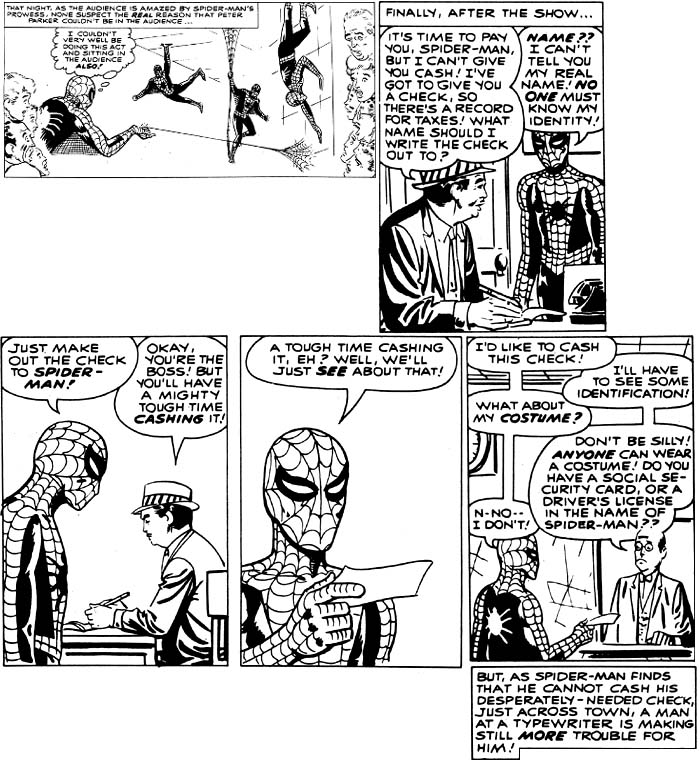
Source: The Amazing Spider-Man (vol. 1) #1 (Mar. 1963), pg. 4, panels 1-5. Written by Stan Lee. Art by Steve Ditko.
Panel 6 on page 4 features the second-ever appearance of J. Jonah Jameson. The first drawing of the character was on the splash page (page 1), where he could have just been a face in the crowd. Now it becomes clear that he will be a major player in the drama that is Spider-Man's life. It is also clear that he does not like Spider-Man, although it is not yet clear why he feels this way.
J. Jonah Jameson mentions that he is writing an "article." It soon becomes apparent (in the next two panels) what kind of "article" this is. J. Jonah Jameson is a publisher and he was writing an anti-Spider-Man editorial. When Spider-Man loses his performing gig due to Jameson's editorial, it becomes clear that the publisher is an influential figure that many people in the city read or listen to.
BELOW: J. Jonah Jameson embarks on his campaign against Spider-Man, an obsession that will shape the rest of his life:
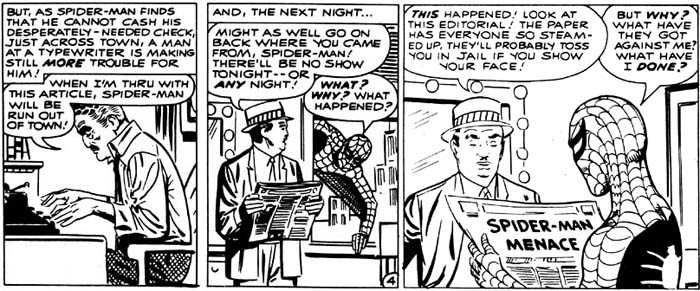
Source: The Amazing Spider-Man (vol. 1) #1 (Mar. 1963), pg. 4, panels 6-7. Written by Stan Lee. Art by Steve Ditko.
The rest of page 5 continues to illustrate J. Jonah Jameson's campaign against Spider-Man, and how Jameson's words and actions are making life difficult for Spider-Man.
BELOW: J. Jonah Jameson embarks on his campaign against Spider-Man, an obsession that will shape the rest of his life:

Source: The Amazing Spider-Man (vol. 1) #1 (Mar. 1963), pg. 5, panels 2-5. Written by Stan Lee. Art by Steve Ditko.
Panel 6 on page 5 illustrates a couple of interesting points. Peter Parker is clearly very concerned with money. He now considers himself a superhero (or "superhuman guy") in the same category as more established heroes such as the Fantastic Four and Ant Man, but he seems less interested in this point in the "hero" part of his career than in how to make money. He wonders who come they always seem to have enough money.
The news stand owner's comment is also interesting. He doesn't think that Spider-Man even exists. Spider-Man has already appeared on television numerous times at this point, has been written about in newspapers, and has been seen by countless witnesses swinging throughout the city. But the news stand owner thinks that Spider-Man doesn't exist. This man may never believe that Spider-Man exists until he sees the web-swinger with his own eyes. Even then, he would probably be skeptical.
Stan Lee here seems to be observing a truth about life: People believe what they want to believe. Evidence or the opinion of the majority often will do little to persuade people. Certainly this concept is of interest in religious discussions. People with strong beliefs can be frustrated or simply disappointed that everybody doesn't see things their way.
Historically, for example, many Americans have had strong beliefs based on their religious beliefs and ethical values that slavery was wrong. The immorality of this institution seemed so plain to them, but much of the country disagreed with them. The Civil War was even fought, in large part, over the issue. There were devout Christians and sincere secularists on both sides of the debate, but neither could really "prove" that their side was right to the other. Eventually it was the force of arms that settled the matter, followed by decades of struggle for civil rights and and end to prejudices.
Today the merits of continuing to practice slavery are rarely debated, but other questions are equally impossible to "prove" to every person. Whether or not capital punishment and unrestricted abortion are moral or should remain legal are two topics that have many arguments on both sides, from both religious as well as "secular" perspectives. But, ultimately, these are religious, moral and ethical questions which can not be settled simply through appeal to "evidence" or "scientific examination." Similarly, many people believe in overtly religious concepts such as the existence of God and the afterlife. They will point to a preponderance of evidence that supports their position and endless reasons clear-cut examples of how it is beneficial to themselves and society to believe as they do. But others are more skeptical, and, like the news stand owner, do not believe in what they have not seen for themselves. This side is willing (sometimes even enthusiastic) to counter every argument of the "believers" with arguments against their beliefs. Ultimately, people decide what to believe and how to act on those beliefs for numerous reaosons, but emperical evidence is never the only basis for the decisions people make.
J. Jonah Jameson is a good example of this. Jameson certainly wasn't raised to hate Spider-man. There was no Spider-Man when Jameson's cognitive processes were being formed and his worldview was being shaped as a young child. Jameson doesn't hate Spider-Man because of the influence of others. Jameson made a decision on his own, for a variety of reasons, to hate Spider-Man, and to make this hatred the most important cause in his life.
Many of J. Jonah Jameson's reasons for hating Spider-Man seem valid. Jameson raises many good points. Much of what he says is based on evidence and the accounts of eyewitnesses. Nevertheless, much of what Jameson says is factually wrong. He has considered evidence, but he has come to incorrect conclusions. Spider-Man has indeed been seen fleeing from crime scenes or from burning buildings, but Jameson is incorrect in assuming that it was Spider-Man who was engaged in crime or that it was Spider-Man who was starting fires. Jameson believes that because he can point to evidence and logically draw conclusions from such evidence, but he is mistaken in his belief that his conclusions are correct. Jameson's knowledge is imperfect, and most of his assumptions about Spider-Man's behavior and motives are incorrect.
In Amazing Spider-Man #1 we see J. Jonah Jameson draw his own conclusions about Spider-Man and make a conscious decision to crusade aginst the wall-crawler. In essence, J. Jonah Jameson becomes the founder and principle follower of a secular religion of "hating Spider-Man." Jameson never considers this his personal "religion," but this is what it is, as this is his principle motivation and the basis for his actions. Jameson seems unconcerned with beliefs such as Humanism or Christianity or Judaism or Civil Rights or Atheism or Deism or Environmentalism or any other organized belief system or philosophy. Jameson's principle belief from this point on is that Spider-Man is a menace who must be stopped.
In Jameson's crusade against Spider-Man, he does indeed make many valid points. But he is so consumed by his hatred of Spider-Man that his beliefs cloud everything he sees. Jameson acts and thinks irrationally. Even when Spider-Man clearly acts heroically, even when he saves J. Jonah Jameson's own son, the newspaper publisher refuses to see things as they truly are.
Some people think that identifying J. Jonah Jameson's religion as "hating Spider-Man" is a joke. This assessment is not intended to be humorous. It is true that "hating Spider-Man" is not a traditionally recognized religion. It is not an organized religion. It is not even a very nice religion. It is certainly not a "religion" in the generally used positive sense of the word. "Hating Spider-Man" is a negative, idiosyncratic, irrational and personally-created religion. But this is the only religion that J. Jonah Jameson seems to practice.
BELOW: Peter Parker is frustrated after being labeled a menace by J. Jonah Jameson's newspapers. Peter here is primarily thinking about making money:

Source: The Amazing Spider-Man (vol. 1) #1 (Mar. 1963), pg. 5, panel 6. Written by Stan Lee. Art by Steve Ditko.
Pages 4 and 5 Complete Text:
Narration: That night, as the audience is amazed by Spider-Man's prowess, none suspect the real reason that Peter Parker couldn't be in the audience . . .
Spider-Man: [Thinking] I couldn't very well be doing this act and sitting the audience also!
Narration: Finally, after the show . . .
Man in business suit (the theater manager or booking agent?): It's time to pay you, Spider-Man, but I can't give you cash! I've got to give you a check, so there's a record for taxes! What name should I write the check out to?
Spider-Man: Name?? I can't tell you my real name! No one must know my identity! Just make the check out to Spider-Man!
Man in business suit: Okay, you're the boss! But you'll have a mighty tough time cashing it!
Spider-Man: A tough time cashing it, eh? Well, we'll just see about that!
[At a bank counter]
Spider-Man: I'd like to cash this check!
bank teller: I'll have to see some identification!
Spider-Man: What about my costume!
bank teller: Don't be silly! Anyone can wear a costume! Do you have a social security card, or a driver's license in the name of Spider-Man??
Spider-Man: N- No-- I don't!
Narration: But, as Spider-Man finds that he cannot cash his desperately-needed check, just across town, a man at a typewriter is making still more trouble for him!
J. Jonah Jameson: When I'm thru with this article, Spider-Man will be run out of town!
Narration: And, the next night . . .
[Spider-Man leans through the window of the theater office to talk to the same man in a business suit who had written a check for him the night before. The man is reading a newspaper.]
Man in business suit: Might as well go on back where you came from, Spider-Man! There'll be no show tonight -- or any night!
Spider-Man: What? Why? What happened?
Man in business suit: This happened! Look at this editorial! The paper has everyone so steamed up, they'll probably toss you in jail if you show your face!
[Spider-Man looks at the newspaper headline. It reads: "Spider-Man Menace"]
Spider-Man: But why? What have they got against me? What have I done?
Narration: But, not satisfied with merely writing editorials, J. Jonah Jameson, publisher of the powerful "Daily Bugle" delivers lectures all over town . . .
J. Jonah Jameson: [Lecturing to an audience.] We cannot allow that masked menace to take the law into his own hands! He is a bad influence on our youngsters! Children may try to imitate his fantastic feats! Think what would happen if they make a hero out of this lawless, inhuman monster! We must not permit it! I say that Spider-Man must be outlawed! There is no place for such a dangerous creature in our fair city! [J. Jonah Jameson holds up a photograph of his son, John Jameson, wearing an astronaut's suit, including helmet.] The youth of this nation must learn to respect real heroes -- men such as my son, John Jameson, the test pilot! Not selfish freaks such as Spider-Man -- a masked menace who refuses to even let us know his true identity!
[A clearly upset Peter Parker is shown reading negative newspaper and magazine headlines about himself at a news stand.]
Peter Parker: I don't get it! How do other superhuman guys, like the Fantastic Four and the Ant Man, get away with it?? Nobody bothers them! And they always seem to make enough dough!
news stand owner: Bah! I don't even believe that there is a Spider-Man! It's all a publicity stunt!
BELOW: Peter ponders how to make money. His noble Aunt May pawns her jewelry rather thank letting Peter quit school. She remains cheerful despite her troubles:
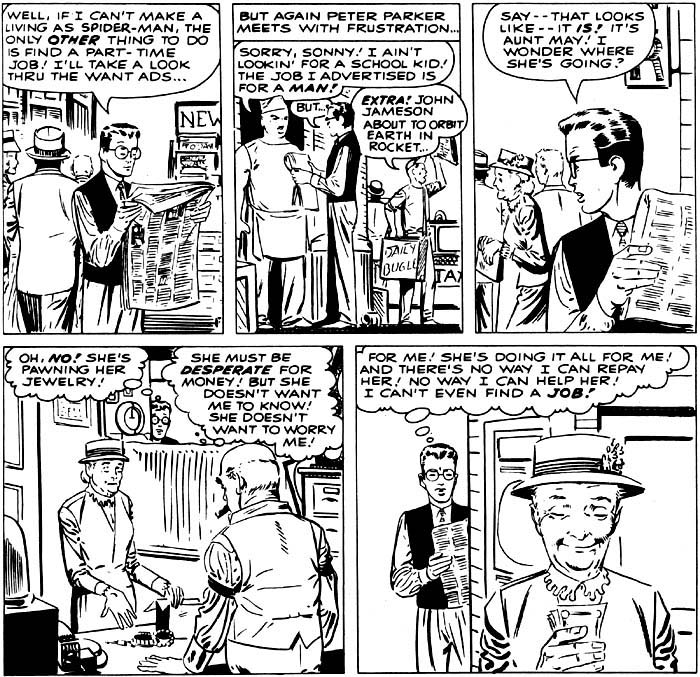
Source: The Amazing Spider-Man (vol. 1) #1 (Mar. 1963), pg. 6, panels 1-5. Written by Stan Lee. Art by Steve Ditko.
Page 6 demonstrates many admirable traits in Aunt May. Peter Parker sees his aunt (but she doesn't see him) when she goes into a pawn shop and pawns her jewelry. From the way Peter is distressed upon seeing this, it is clear that this is jewelry that May Parker has owned for a long time. This may be a family heirloom or jewelery that her beloved husband Ben gave her. But she pawns the jewelry so that she can take care of Peter. When she leaves the pawn shop, we see that she is smiling broadly. This must be an act of great self-sacrifice, yet she does this cheerfully. She will do what she must to provide for her family. Her nephew Peter is the most important thing in the world to her. Peter thinks to himself, "She must be desperate for money! But she doesn't want me to know! She doesn't want to worry me! For me! She's doing it all for me! And there's no way I can repay her!"
BELOW: Peter Parker is frustrated and desperate to earn money:

Source: The Amazing Spider-Man (vol. 1) #1 (Mar. 1963), pg. 6, panels 6-7. Written by Stan Lee. Art by Steve Ditko.
Peter Parker is extremely frustrated by his inability to find paying work. He hates to see what Aunt May is going through for him. Peter sees another newspaper featuring J. Jonah Jameson. Peter clearly recognizes that it is J. Jonah Jameson who is behind the wave of public distrust of Spider-Man. This is apparently the first time that Peter Parker recognizes Jameson's hand in the smeer campaign against him. This is the start of Peter's feelings of enmity toward Jameson.
After seeing Jameson's name and photo on the front page of the latest newspaper, Peter becomes even more frustrated, so much so that he pounds on a brick wall. Despite his frustrations, Peter desperately wants to earn money to help his aunt. Peter declares that he "can't let Aunt May down," even "if it means the Spider-Man will again stalk the city by night!"
What does Peter mean by suggesting that Spider-Man might "stalk the city by night"? It seems that he may be so desperate to help his Aunt by making money that he would be willing to engage in criminal activity. This might make it seem like Peter Parker is not behaving heroically. But the truth is, despite his frustration and desperation, Peter does not become a thief. His thoughts and temptations do not mean that he is not a hero. It is Spider-Man's actions (regardless of those thoughts) that mark him as a true hero.
Page 6 Complete Text:
[Peter Parker is reading the "help wanted" section of the classified ads in a newspaper, while he stands at a news stand.]
Peter Parker: Well, if I can't make a living as Spider-Man, the only other thing to do is find a part-time job! I'll take a look thru the want ads . . .
Narration: But again Peter Parker meets with frustration . . .
Short-order cook at a diner: Sorry, sonny! I ain't lookin' for a school kid! The job I advertised is for a man!
Peter Parker: But . . .
[Nearby, a newsboy shouts out the latest headline.]
Newsboy: Extra! John Jameson about to orbit Earth in rocket . . .
[Peter notices his elderly Aunt walking somewhere. She does not see him as he turns and follows her.]
Peter Parker: Say -- that looks like -- it is! It's Aunt May! I wonder where she's going?
Peter Parker: [Thinking] Oh, no! She's pawning her jewelry! She must be desperate for money! But she doesn't want me to know! She doesn't want to worry me! For me! She's doing it all for me! And there's no way I can repay her! No way I can help her! I can't even find a job!
Newsboy: Extra! John Jameson, son of the publisher of the "Daily Bugle" about to orbit Earth! Extra!
Peter Parker: It's all his fault! Because of him I can't perform in public as the Spider-Man! [Angrily pounding on brick wall.] But I can't give up! I've got to earn some money -- somehow! I can't let Aunt May down! Even if it means the Spider-Man will again stalk the city by night!
Page 7 is dominated by images of the Apollo-style rocket that will take J. Jonah Jameson's son John to space. The imagery is clearly based on scenes from NASA operations in Florida, yet the story takes place locally, in New York City.
BELOW: A rare glimpse of an emotion within Jameson other than hatred of Spider-Man: J.J.J. is truly proud of his beloved son:
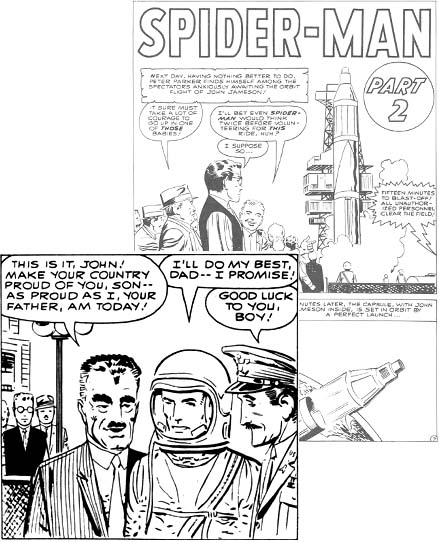
Source: The Amazing Spider-Man (vol. 1) #1 (Mar. 1963), pg. 7, panel 2. Written by Stan Lee. Art by Steve Ditko.
The part of page 7 of particular interest in our discussion of religion and ethics in this issue is panel 2. A clearly beaming J. Jonah Jameson speaks warmly to his son, who clearly loves his dad back:
J. Jonah Jameson: This is it, John! Make your country proud of you, son-- As proud as I, your father, am today!
John Jameson: I'll do my best, Dad -- I promise!
This is a rare example in this story of J. Jonah Jameson exhibiting an emotion other than hatred of Spider-Man. J. Jonah Jameson seems to put all thoughts of Spider-Man aside at this incredible moment in his son's life. It is easy to see that J. Jonah Jameson is very close to his son.
J. Jonah Jameson's love for his son is admirable. It is certainly not a negative trait. This display humanizes the character somewhat, and makes him more three-dimensional. But is this really that significant in how we evaluate the character?
Well, one can suppose that if Jameson was mean or cold or hateful toward his obviously admirable son, the elder Jameson would seem like even more of a monster. People are not perfect. But no matter how unethical people behave, no matter how far they fail in living up to the tenets of their religion or belief system or their declared values, most people love their children. Most (but obviously not all) people want what is best for their children and act in ways to benefit their children.
We see this in real life as well as in fiction. Countless are the fictional (and real) mobsters who commit crimes in their "professional life" but try to shelter and protect and provide for their beloved children. Brutal dictators and other clearly evil leaders have often sheltered and even pampered their children. Even most comic book villains do this. For example, Spider-Man's arch enemy Harry Osborn (the Green Goblin) hated Spidey but wanted (in his own twisted way) what was best for his beloved son, Harry. In both real life and fiction, it is relatively rare to encounter parents who declare hatred of or consciously work to harm their children.
So, J. Jonah Jameson's love of his son is a good thing. But in the greater scheme of things, it is not that impressive and it is not a sufficient enough good to consider Jameson a positive, socially beneficial person overall.
In pointing out how sensible it is to expect God to answer the prayers of his children, Jesus said (Matthew 7:7-11, KJV):
7. Ask, and it shall be given you; seek, and ye shall find; knock, and it shall be opened unto you:
8. For every one that asketh receiveth; and he that seeketh findeth; and to him that knocketh it shall be opened.
9. Or what man is there of you, whom if his son ask bread, will he give him a stone?
10. Or if he ask a fish, will he give him a serpent?
11. If ye then, being evil, know how to give good gifts unto your children, how much more shall your Father which is in heaven give good things to them that ask him?
One point of these verses is that even regular humans, who fall fall short of the perfection of God, naturally provide for their children and answer their petitions.
A related Biblical passage points out that doing good only to one's loved ones is not particularly impressive. Jesus told his followers that loving their neighbors and hating their enemies wasn't good enough. He commanded them to love their everyone, even their enemies. Even the "publicans" treat their loved ones well, he pointed out. (The word "publicans" is also translated as "tax collectors, a group that Jesus's audience regarded as the "scum of the earth"). From Matthew 5:43-47:
43. Ye have heard that it hath been said, Thou shalt love thy neighbour, and hate thine enemy.
44. But I say unto you, Love your enemies, bless them that curse you, do good to them that hate you, and pray for them which despitefully use you, and persecute you;
45. That ye may be the children of your Father which is in heaven: for he maketh his sun to rise on the evil and on the good, and sendeth rain on the just and on the unjust.
46. For if ye love them which love you, what reward have ye? do not even the publicans the same?
47. And if ye salute your brethren only, what do ye more [than others]? do not even the publicans so?
J. Jonah Jameson's own life illustrates these points well. Yes, it's nice that Jameson loves his son. All parents should do the same. But this doesn't negate the negative impact of Jameson's vendetta against Spider-Man.
Loving and caring for one's children is never enough to make somebody a "good person." Peter Parker himself lives by a far nobler code. He recognizes a responsibility to do good to others, even strangers. He also recognizes the need to live by ethical values (call them "commandments", such as "Thou shalt now steal", or "moral principles," or whatever you prefer). Peter Parker lives by these principles even when doing so is difficult and inconveniences him.
In this story, we see that Peter Parker desperately loves his aunt and wants to help he. He briefly considers turning to crime in order to do so, but he does not act upon these thoughts. Peter Parker instead tries to do the right things. He is committed to making money legally.
Peter Parker goes far beyond simply providing for himself and his own family. As Spider-Man, he even risks his own life to help others. In this story Spider-Man uses his gifts to rescue John Jameson - somebody who not only is not a friend or family member, but a person who is actually the son of Spider-Man's enemy: J. Jonah Jameson.
In this story, Peter Parker literally lives Jesus's injunction in Matthew 5:44 to "Love your enemies, bless them that curse you, do good to them that hate you... and persecute you."
Certainly if anybody "hates" and "persecutes" Spider-Man, it is J. Jonah Jameson. Yet Spider-Man does perhaps the greatest "good" that could be done for his enemy: he saves the life of his son.
BELOW: Irrational: Even while Spider-Man is offering to help save his son, J. Jonah Jameson can't stop hating Spider-Man:

Source: The Amazing Spider-Man (vol. 1) #1 (Mar. 1963), pg. 9, panel 5. Written by Stan Lee. Art by Steve Ditko.
Before Spider-Man saves the life of astronaut John Jameson, he visits mission control to tell them his plan. The officers in charge of the mission knows that they have exhausted the possible avenues for rescuing John Jameson. He sees no reason not to let Spider-Man attempt to rescue the astronaut. But Jameson's hatred of Spider-Man is so all-consuming that he can't even see that her hero is there to help save his own son. How clouded is J. Jonah Jameson's thinking that he tries to stop the only person who has a chance of saving his son? J.J.J. truly becomes irrational when it comes to Spider-Man.
Spider-Man: Let me have the missing unit! I'll get it to the capsule somehow!
mission control officer: Very well! We have nothing to lose! There is no way we can do it!
J. Jonah Jameson: Spider-Man-- Bah! He's just a publicity-seeking phony! He's trying to grab a headline! What can he do?
Spider-Man realizes that J. Jonah Jameson is not going to listen to reason. He gets going on his mission to rescue John, even as the elder Jameson yells "Wait!" J.J.J. would probably stop Spider-Man if he could. Fortunately for John, his father is unable to stop Spider-Man.
BELOW: J. Jonah Jameson shows genuine love and concern for his astronaut son:

Source: The Amazing Spider-Man (vol. 1) #1 (Mar. 1963), pg. 13, panel 1. Written by Stan Lee. Art by Steve Ditko.
The scientifically ridiculous details of Spider-Man's rescue of John Jameson in the out-of-control landing capsule are unimportant for our discussion here. Suffice it to say, Spider-Man gets the job done, at great risk to his own life.
Once mission control confirms John's safety, J. Jonah Jameson expresses sincere tender feeling for his son. Note the look on J. Jonah Jameson's face (page 13, pane 1) as he says, "My boy! He's safe!"
BELOW: Spider-Man avoids the embarrassment of the public adulation he imagines would be his after heroically saving astronaut John Jameson, only to be shocked by the irrational, angry reaction of John's father, J. Jonah Jameson:
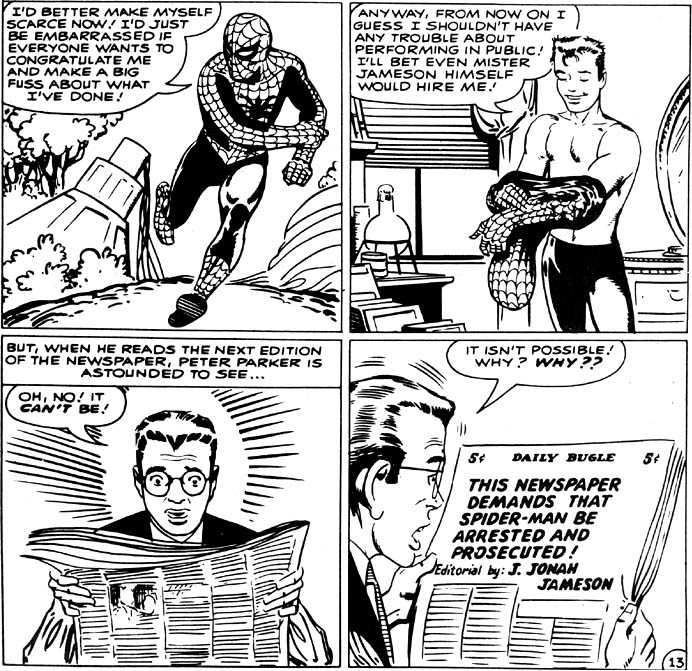
Source: The Amazing Spider-Man (vol. 1) #1 (Mar. 1963), pg. 13, panels 3-6. Written by Stan Lee. Art by Steve Ditko.
After rescuing the helpless astronaut, Spider-Man rushes away before anyone can arrive at the landing spot of the safely arrived landing capsule. Spider-Man seems sincere when he says he wants to avoid embarrassment caused by people making a fuss about his rescue. He expresses humility here, although he also clearly realizes he has done a great thing.
Spider-Man seems certain that, having saved Jameson's son, the publisher will end his vendetta against him. Yet, against all reason, Jameson simply ramps up his anti-Spider-Man campaign, as Peter Parker sees in the next day's headline.
Pages 13, Panels 3-6 Complete Text:
Spider-Man (Peter Parker): I'd better make myself scarce now! I'd just be embarrassed if everyone wants to congratulate me and make a big fuss about what I've done! Anyway, from now on I guess I shouldn't have any trouble about performing in public! I'll bet even Mister Jameson himself would hire me!
Narration: But, when he reads the next edition of the newspaper, Peter Parker is astounded to see . . .
Peter Parker: Oh, no! It can't be! It isn't possible! Why? Why??
Text seen on newspaper page: This newspaper demands that Spider-Man be arrested and prosecuted! Editorial by J. Jonah Jameson
BELOW: J. Jonah Jameson's hatred of Spider-Man distorts everything he sees that involves the target of his obsession:
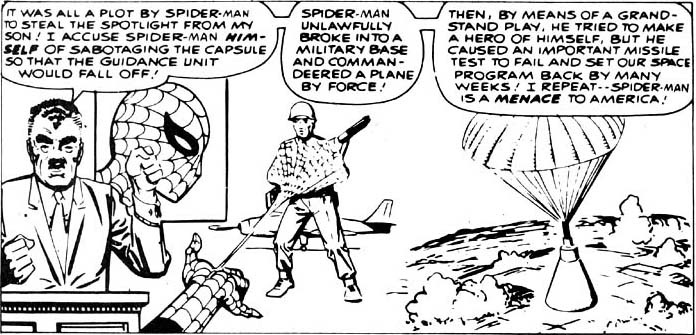
Source: The Amazing Spider-Man (vol. 1) #1 (Mar. 1963), pg. 14, panel 1. Written by Stan Lee. Art by Steve Ditko.
On page 14 we see J. Jonah Jameson delivering a shockingly inaccurate, distorted account of Spider-Man's rescue of his own son. Against all reason and evidence, Jameson blames everything bad about the situation, including the initial malfunction, on Spider-Man. Jameson truly is an irrational believer in his peculiar anti-Spider-Man worldview.
J. Jonah Jameson lectures:
J. Jonah Jameson: It was all a plot by Spider-Man to steal the spotlight from my son! I accuse Spider-Man himself of sabotaging the capsule so that the guidance unit would fall off! Spider-Man unlawfully broke into a military base and commandeered a plane by force! Then, by means of a grandstand play, he tried to make a hero of himself, but he caused an important missile test to fail and set our space program back by many weeks! I repeat -- Spider-Man is a menace to America!
Notice here how J. Jonah Jameson looks at evidence and uses some of it in his diatribe. There is indeed a grain of truth in Jameson's account of events. Spider-Man really did "unlawfully break into a military base" and it is true that Spider-Man "commandeered a plane by force." One could say that there is a grain of truth to other statements that Jameson makes about Spider-Man. But Jameson completely misses the truth of the whole event: Spider-Man had nothing to do with the landing capsule's malfunction and he acted as a hero in saving astronaut John Jameson.
In response to Jameson's lectures, public statements and newspaper editorials, the people of the city argue about whether Spider-Man is a menace or hero.
BELOW: With the world seemingly against him, even after he has acted heroically, Peter Parker wonders whether a life as a criminal or a menace is all that is left for him:
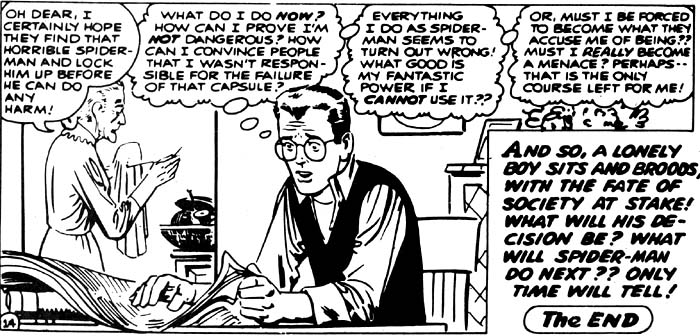
Source: The Amazing Spider-Man (vol. 1) #1 (Mar. 1963), pg. 14, panel 4. Written by Stan Lee. Art by Steve Ditko.
After seeing how J. Jonah Jameson and the public react to his rescue, Peter Parker is understandably distraught. Even his Aunt May notices the news about Spider-Man and speaks ill of him. Of course, Aunt May does not know that Spider-Man is actually her beloved nephew, Peter Parker.
Aunt May: Oh dear, I certainly hope they find that horrible Spider-Man and lock him up before he can do any harm!
Peter Parker: [Thinking] What can I do now? How can I prove I'm not dangerous? How canI convince people that I wasn't responsible for the failure of that capsule? Everything I do as Spider-Man seems to turn out wrong What good is my fantastic power if I cannot use it?? Or, must I be forced to become what they accuse me of being?? Must I really become a menace? Perhaps -- that is the only course left for me!
Narration: And so, a lonely boy sits and broods, with the fate of society at stake! What will his decision be? What will Spider-Man do next?? Only time will tell!
It is interesting to note how Peter Parker here wonders if he will be forced into becoming a menace. He doesn't want to be a menace or a criminal. But in his understandable bitterness about being misperceived by the public and slandered by J. Jonah Jameson, he ponders whether he just might become what people accuse him of being.